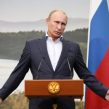
WILL WESTERN PRAGMATISM TOWARD MOSCOW OUTLAST THE G-8 SUMMIT?
Publication: Eurasia Daily Monitor Volume: 3 Issue: 136
By:

For several months the so-called Russian backslide on democracy has dominated public discussions during the run up to the G-8 summit in St. Petersburg. Would Western leaders address the “backslide” during the July 15-17 summit?
Civic and political activists opposed to Russian President Vladimir Putin’s rule organized a conference on “The Other Russia” in Moscow this week. The conference approved a bold statement addressed to Western leaders: “Systematic repression against the Russian opposition has become, in fact, the prelude to the G-8 summit in St. Petersburg” (Moscow Times, July 13).
Western human rights activists strongly supported the appeal. Holly Cartner, Europe and Central Asia director for Human Rights Watch, summed up this viewpoint: “Russia’s attempts to stifle an independent gathering speak louder than the lip service it pays to democracy. G-8 leaders must tackle Russia’s Potemkin democracy” (Human Rights Watch, July 13).
While Putin’s internal opponents clamored for attention, the Kremlin and the West were preoccupied with things more important. The main issue was Iran and its nuclear ambitions and, to a lesser extent, North Korea and its ballistic missiles. The bargaining was intense and, in the end apparently, successful.
A tentative compromise was reached between Moscow and Washington on Russia’s entry into the World Trade Organization. Russian Finance Minister Alexei Kudrin told reporters yesterday: “We agreed to allow foreign insurance companies to operate directly in Russia, while foreign banks will not have direct representation” (RIA-Novosti, July 13). Kudrin was positive that a protocol with the U.S. on Russia’s WTO admission would be signed during or just before the G-8 summit and that Russia’s formal accession to the organization will follow in a few months.
In return the Kremlin has changed its stance on Iran’s nuclear problem. Until this week, Russia insisted that Iran be given more time to consider a response to the offer made by the five permanent UN Security Council members plus Germany to permanently stop uranium enrichment in exchange for aid and other incentives. Tehran had promised to answer only sometime in August, while at the same time continuing enrichment.
This week Russia suddenly agreed with the West that Iran should be referred to the UN Security Council without further delay. Russian Foreign Minister Sergei Lavrov also told a pro-Kremlin web news portal that while Moscow is still fully opposed to the use of force against Iran, he does not exclude the imposition of sanctions (strana.ru, July 13).
On July 13 Russia and China agreed with Japan and the West on a draft UN Security Council resolution condemning the North Korean ballistic missile tests. Before that, Russia and China had insisted that a statement from the UN Security Council chairman be issued instead of a resolution.
Now the G-8 leaders may address North Korea and Iran at the St. Petersburg summit based on a consensus opinion. With the main thorny issues dealt with for the time being and everybody happy, human rights and Russia’s “Potemkin democracy” will surely get no more than lip service at the summit.
As it happened time and again during the Cold War, the West has used human rights and democracy issues to press the Kremlin into compromises in security and economic matters. Former U.S. Secretary of State Henry Kissinger used to call such proceedings “realpolitik.” But will this newly minted realpolitik horse trade, hastily prepared for the G-8, last longer than the weekend? Today’s world is different from the stable, predictable environment of the Cold War. The Kremlin is also different. A deal reached with one part of Putin’s administration may be openly sabotaged by a rival bureaucratic clique.
Washington wants Moscow to freeze nuclear cooperation and the sale of new weapons to Iran. New anti-aircraft missiles that Russia is prepared to sell to Iran could endanger the lives of U.S. pilots if force is used in the future to subdue Tehran’s nuclear ambitions.
Nuclear cooperation is even more important. At present Iran’s enrichment capabilities are tiny and its supply of uranium remains limited. However, if Moscow provides, as it has promised, some 100 tons of nuclear fuel for the Bushehr nuclear power plant in the coming months, the situation may change dramatically. It is a standard technical procedure to supply a nuclear reactor with reserve fuel rods — more than are needed for start up. By diverting just a few fuel rods, converting the enriched uranium from the rods into fluorine gas, and further enriching it using its limited number of centrifuges, Iran might produce enough arms-grade uranium to make a bomb in months, not years.
Will Russia stop its cooperation with Iran after the G-8 is over? Will the U.S. Congress promptly pass legislation that is essential for Russia to indeed join the WTO in the absence of a clear commitment from Moscow to freeze its arms and nuclear deals with Tehran? How soon will the G-8 consensus unravel?
One thing is clear: Pro-democracy and human rights activists in Russia are on their own no matter what the eventual outcome.




